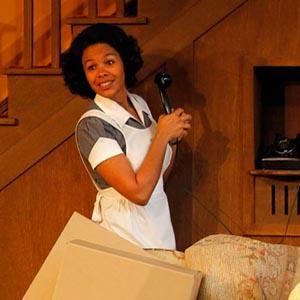The play sets up two worlds, two times in the same house – the first half set in 1959, the second in 2009. In the first half, Russ (Greg Stone) and his flimsy flappable wife Bev (Alison Whyte) are about to move out of their house to the suburbs. Underlying all their interactions is grief for their son who committed suicide after returning from the Korean War. But the far greater concern of their neighbours, represented by Karl (Patrick Brammall) from the Clybourne Park Improvement Association, is that a black family is to move into the house with potentially detrimental effects on real estate prices. Karl’s wife, Betsy (Laura Gordon), the local vicar, Jim (Luke Ryan) and Russ and Bev’s housekeeper, Francine (Zahra Newman) and her husband Albert (Bert LaBonte) are all awkwardly and at times humorously drawn in.
In the second half, the actor’s roles are transposed, Patrick Brammal and Laura Gordon become a yappy white couple, Steve and Lindsey, about to have a baby and intent on demolishing the same house, now in disrepair after years of neglect, to build a modern mansion. Zahra Newman and Bert LaBonte, as Lena and Kevin, middle class and well educated, represent the local community’s concerns that the heritage and unique character of the area are under threat. Yet, the assumption being toyed at is of reverse racism.
The first half of Clybourne Park plays on its ‘this is the 50s’ asides intended to make us laugh at those silly, less sophisticated people of times gone by. It then points out just how short a distance has been travelled in its portrayal of integration 2009-style. In Norris’s modern America the underlying tension and racial antipathy are strikingly more hostile, despite being tiptoed around with political niceties, than in the quaint highly-idealised 50s. In the production’s second half, political correctness is turned into a weapon, as pressure to ‘not’ be offended becomes a pointed psychological arm wrestle.
Many of the cast are familiar favourites with MTC audiences. Zahra Newman and Bert LaBonte were particularly entertaining and enjoyable to watch. Greg Stone also makes the most of his role, drawing out the comic and emotional opportunities.
MTC Artistic Director Simon Phillips says in the press release for the production, ‘You don’t need to know the iconic fifties play that Norris uses as his starting point, Lorraine Hansberry’s A Raisin in the Sun, any more than you need to know the original song on which a jazz man constructs his improvisations’. You don’t need to, but it certainly helps.
It’s not that I know the play that well, but even a cursory reading of the history is insightful. Lorraine Hansberry’s family was one of the first black families to move into a predominantly white area in Chicago in the late 1930s, which led to an important civil case (Hansberry vs Lee 1940) on racially restrictive covenants. The play she wrote about the issue, A Raisin in the Sun, was groundbreaking, and the first play by an African American woman to be produced on Broadway when it premiered in 1969. It has immortalized the Washington Park area on which the fictional Clybourne Park is based, just as Norris’s play promises to build on that history by portraying the effects that are now being wrought by ‘urban gentrification’.
Much of the coverage of the play seems to laud the play’s construction yet the flipside two time-period metaphor skates dangerously close to cliché. Similarly there is little subtly to the hypocrisy, bigotry and sexism being portrayed either in the past or now. With lines like, “We all have our place,” from Russ and Bev’s line, “If knowledge is power, then I choose to remain powerless,” (tee hee I’m just a woman) the ‘messages’ in the first half are particularly heavy handed.
What is thought provoking is the way Norris’s characters seem to move in parallel slipstreams within the same space. People seem to neither hear nor see one another and are the lesser for it. The play’s popular success however is built on its pace and witty repartee, the familiar human frailties it portrays and its at times excruciating comedy of awkwardness.
Ultimately, Clybourne Park is enjoyable, ensuring good laughs and featuring great performances that are sure to win it wide appeal. But it’s hard to avoid the point that it’s a play that is taking a serious, hard to talk about social issue – an issue with a particular American cast to it – and is turning it into light entertainment. It should be edgy parody; it should cut to the quick, but in Australia, so far away from Chicago’s Washington Park, it loses its bite.
Rating: Three and a half stars
Clybourne Park
by Bruce Norris
Director: Peter Evans
Set & Costume Designer: Christina Smith
Lighting Designer: Matt Scott
Composer: Jethro Woodward
Assistant Director: Adena Jacobs
Cast: Patrick Brammall, Laura Gordon, Bert LaBonte, Zahra Newman, Luke Ryan, Greg Stone and Alison Whyte
MTC Sumner Theatre
September 17 – October 26
For ticketing details visit www.mtc.com.au/





